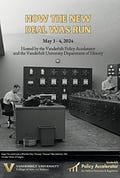Being an academic means attending a lot of conferences.
Some are sprawling ones for the whole profession (in my case, historians), or large parts of the profession (U.S. historians), or smaller subsets of the profession (urban, Southern, etc.).
But every now and then, there’s a small focused conference that brings together a great group of scholars to tackle a specific issue. I organized one of these at Princeton two decades ago, where the papers became The New Suburban History, or and we held a (virtual) one to help launch the Myth America collection.
This weekend I had the pleasure of taking part in probably the best instance of that second category I’ve ever seen, a conference that Sarah Igo and Ganesh Sitaraman convened at Vanderbilt called “How the New Deal Was Run.”
The conference featured an array of pre-circulated papers by outstanding historians and political scientists who are working on the New Deal (including Sarah Igo, Sarah Phillips, Neil Maher, Jason Scott Smith, Eric Rauchway, Kathy Olmsted, Brent Cebul, Mason Williams, Sharon Musher, Abby Spinak, Meg Jacobs, etc. etc.) And then a lot of us were there to offer reflections and pepper the authors with questions, and wow, what an amazing line up of senior scholars (Liz Cohen, Gary Gerstle, Nelson Lichtenstein, Tom Sugrue, Laura Kalman, Brian Balogh, Bev Gage, etc. etc.)
Following the mandate of the conference organizers, most of the papers tackled a specific New Deal agency — Social Security, the CCC, etc. — and really got under the hood to explore the nitty gritty of their origins and daily operations. While a lot of New Deal historiography takes sweeping views of The Big Picture, these papers were refreshingly focused on the little details that really do matter.
Collectively, they formed a picture of How the New Deal Was Run (as advertised!) but in a larger sense it was a crash course in the possibilities and potential in government. Commenters noted more than once that we live in an era in which political leaders of all parties (but especially the Democrats) bemoan how hard it is to “do big things” but the close study of the New Deal is a real reminder that we’ve done very big things before and under much harder circumstances too.
I’m afraid I can’t give too many details of the actual work — it’s not my place and I’m not sure how much of the amazing work the authors and organizers want to give away on the internet here — but I’m confident this will be out as an edited collection in very short order. I’ll be sure to talk about it in length then, but in the meantime, keep your eyes open.
And since I left some things unanswered here … feel free to Ask Me Anything in the comments, New Deal related or not.




How much whites-only got baked in to the New Deal? I think about this thinkpiece from a former GOP footsoldier:
https://www.politicalorphans.com/socialism-for-white-people/
(esp. in the post-WWII context of Truman's proposed health plan) and I'm curious, esp. if votes from Dixiecrats (still Ds at this point in time) were needed.
Always been fascinated by the National Recovery Act signs - "We Do Our Part" - what was the purpose of distributing those signs and what did it mean to "do your part"?